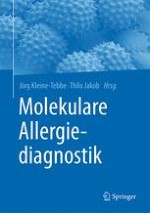Zusammenfassung
Biotechnologisch hergestellte rekombinante Allergene können die molekulare Allergiediagnostik verbessern und werden als Referenzstandards für analytische Methoden eingesetzt. Daneben wurde der Einsatz von rekombinanten Allergenen auch in der spezifischen Immuntherapie schon seit langem als mögliche Verbesserung gegenüber der Verwendung konventioneller Extrakte gesehen. Die Vorteile liegen auf der Hand: Ein schwer zu beschreibender, komplexer Naturstoff wird ersetzt durch die relevanten therapieentscheidenden Bestandteile, die in höchster Qualität reproduzierbar hergestellt werden können. Herausforderungen sind dabei die Auswahl der notwendigen Allergenmoleküle und die Etablierung einer Herstellung, die allen regulatorischen Anforderungen der Zulassung entspricht. Neben unveränderten rekombinanten Allergenen lassen sich biotechnologisch auch hypoallergene Varianten mit erniedrigter IgE-Reaktivität herstellen; für beide Konzepte wurde in klinischen Studien bereits das „Proof of Concept“ gezeigt.











